#good omens 2 meta
Text
A list of my theories
Because I'm starting to write a lot of them and I need a place to keep them all.
The Final Fifteen:
It's a Two-Man Con
The Evidence Stacks Up
More Evidence
For the record
The Big Damn Kiss
AAAUUUGH
Oh, God
The Metatron
Ineffable Mystery:
My murder board 2.0
Maggie Mirror
Things that can be explained by POV switches
Wild theory, hold on
We never go to the pub
If jacket lapels are wings . . .
Maggie, Maggie
The confines of a story
Minisodes:
Minisode connections
More minisode connections
#good omens#good omens discussion#good omens 2#crowley#aziraphale#good omens meta#ineffable husbands#aziracrow#good omens analysis#good omens fan theory#neil gaiman good omens#good omens fandom#good omens 2 analysis#good omens 2 meta#good omens parallels#good omens theories#good omens predictions#good omens obsession#good omens symbols#good omens speculation#good omens brain rot#good omens 2 spoilers#good omens brainrot#good omens clues#good omens crack#good omens thoughts#good omens theory#good omens secrets#ineffable kiss#ineffable divorce
26 notes
·
View notes
Text
Aziraphale’s Choice, the Job Connection, and Michael Sheen’s Morality
Update: Michael Sheen liked this post on Twitter, so I'm fairly certain there is a lot of validity to it.
I’ve had time to process Aziraphale’s choice at the end of Season 2. And I think only blaming the religious trauma misses something important in Aziraphale’s character. I think what happened was also Aziraphale’s own conscious choice––as a growth from his trauma, in fact. Hear me out.
Since November 2022 I’ve been haunted by something Michael Sheen said at the MCM London Comic Con. At the Q&A, someone asked him about which fantasy creature he enjoyed playing most and Michael (bless him, truly) veered on a tangent about angels and goodness and how, specifically,
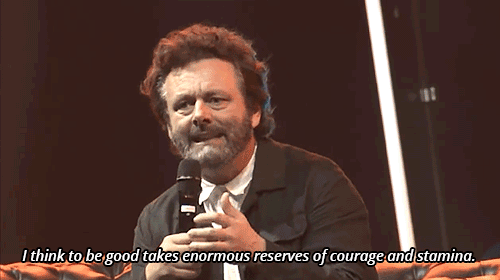
We as a society tend to sort of undervalue goodness. It’s sort of seen as sort of somehow weak and a bit nimby and “oh it’s nice.” And I think to be good takes enormous reserves of courage and stamina. I mean, you have to look the dark in the face to be truly good and to be truly of the light…. The idea that goodness is somehow lesser and less interesting and not as kind of muscular and as passionate and as fierce as evil somehow and darkness, I think is nonsense. The idea of being able to portray an angel, a being of love. I love seeing the things people have put online about angels being ferocious creatures, and I love that. I think that’s a really good representation of what goodness can be, what it should be, I suppose.
I was looking forward to BAMF!Aziraphale all season long, and I think that’s what we got in the end. Remember Neil said that the Job minisode was important for Aziraphale’s story. Remember how Aziraphale sat on that rock and reconciled to himself that he MUST go to Hell, because he lied and thwarted the will of God. He believed that––truly, honestly, with the faith of a child, but the bravery of a soldier.
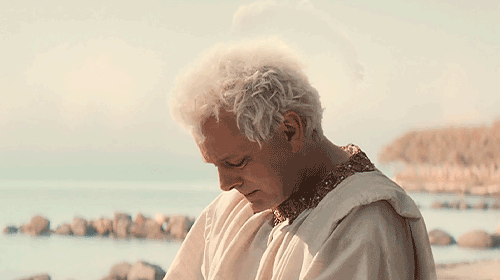
Aziraphale, a being of love with more goodness than all of Heaven combined, believed he needed to walk through the Gates of Hell because it was the Right Thing to do. (Like Job, he didn’t understand his sin but believed he needed to sacrifice his happiness to do the Right Thing.)
That’s why we saw Aziraphale as a soldier this season: the bookshop battle, the halo. But yes, the ending as well.
Because Aziraphale never wanted to go to Heaven, and he never wanted to go there without Crowley.
But it was Crowley who taught him that he could, even SHOULD, act when his moral heart told him something was wrong. While Crowley was willing to run away and let the world burn, it was Aziraphale (in that bandstand at the end of the world) who stood his ground and said No. We can make a difference. We can save everyone.

And Aziraphale knew he could not give up the ace up his sleeve (his position as an angel) to talk to God and make them see the truth in his heart.
I was messed up by Ineffable Bureaucracy (Boxfly) getting their happy ending when our Ineffable Husbands didn’t, but I see now that them running away served to prove something to Aziraphale. (And I am fully convinced that Gabriel and Beelzebub saw the example of the Ineffables at the Not-pocalypse and took inspiration from them for choosing to ditch their respective sides)
But my point is that Aziraphale saw them, and in some ways, they looked like him and Crowley. And he saw how Gabriel, the biggest bully in Heaven, was also like him in a way (a being capable of love) and also just a child when he wasn’t influenced by the poison of Heaven. Muriel, too, wasn’t a bad person. The Metatron also seemed to have grown more flexible with his morality (from Aziraphale's perspective). Like Earth, Heaven was shades of (light?) gray.
Aziraphale is too good an angel not to believe in hope. Or forgiveness (something he’s very good at it).
Aziraphale has been scarred by Heaven all his life. But with the cracks in Heaven’s armor (cracks he and Crowley helped create), Aziraphale is seeing something else. A chance to change them. They did terrible things to him, but he is better than them, and because of Crowley, he feels ready to face them.
(Will it work? Can Heaven change, institutionally? Probably not, but I can't blame Aziraphale for trying.)
At the cafe, the Metatron said something big was coming in the Great Plan. Aziraphale knows how trapped he had felt when he didn’t have God’s ear the first time something huge happened in the Big Plan. He can’t take a chance again to risk the world by not having a foot in the door of Heaven. That’s why we saw individual human deaths (or the threat of death) so much more this season: Elspeth, Wee Morag, Job’s children, the 1940s magician. Aziraphale almost killed a child when he couldn’t get through to God, and he’s not going through that again.
“We could make a difference.” We could save everyone.

Remember what Michael Sheen said about courage and doing good––and having to “look the dark in the face to be truly good.” That’s what happened when Aziraphale was willing to go to Hell for his actions. That’s what happened when he decided he had to go to Heaven, where he had been abused and belittled and made to feel small. He decided to willingly go into the Lion’s Den, to face his abusers and his anxiety, to make them better so that they would not try to destroy the world again.
Him, just one angel. He needed Crowley to be there with him, to help him be brave, to ask the questions that Heaven needed to hear, to tell them God was wrong. Crowley is the inspiration that drives Aziraphale’s change, Crowley is the engine that fuels Aziraphale’s courage.
But then Crowley tells him that going to Heaven is stupid. That they don’t need Heaven. And he’s right. Aziraphale knows he’s right.
Aziraphale doesn’t need Heaven; Heaven needs him. They just don’t know how much they need him, or how much humanity needs him there, too. (If everyone who ran for office was corrupt, how can the system change?)
Terry Pratchett (in the Discworld book, Small Gods) is scathing of God, organized religion, and the corrupt people religion empowers, but he is sympathetic to the individual who has real, pure faith and a good heart. In fact, the everyman protagonist of Small Gods is a better person than the god he serves, and in the end, he ends up changing the church to be better, more open-minded, and more humanist than god could ever do alone.
Aziraphale is willing to go to the darkest places to do the Right Thing, and Heaven is no exception. When Crowley says that Heaven is toxic, that’s exactly why Aziraphale knows he needs to go there. “You’re exactly is different from my exactly.”
____
In the aftermath of Trump's election in the US, Brexit happened in 2018. Michael Sheen felt compelled to figure out what was going on in his country after this shock. But he was living in Los Angeles with Sarah Silverman at the time, and she also wanted to become more politically active in the US.
Sheen: “I felt a responsibility to do something, but it [meant] coming back [to Britain] – which was difficult for us, because we were very important to each other. But we both acknowledge that each of us had to do what we needed to do.” In the end, they split up and Michael moved back to the UK.
Sometimes doing the Right Thing means sacrificing your own happiness. Sometimes it means going to Hell. Sometimes it means going to Heaven. Sometimes it means losing a relationship.
And that’s why what happened in the end was so difficult for Aziraphale. Because he loves Crowley desperately. He wants to be together. He wanted that kiss for thousands of years. He knows that taking command of Heaven means they would never again have to bow to the demands of a God they couldn’t understand, or run from a Hell who still came after them. They could change the rules of the game.
And he’s still going to do that. But it hurts him that he has to do that alone.
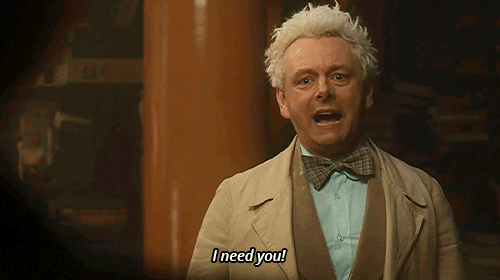
#good omens#good omens 2#ineffable husbands#it's kinda like capt america: civil war#with Azi as Tony Stark: traumatized and trying to do the right thing#and Crowley being Steve Rogers: fuck the establishment let's go rogue#gos2spoilers#good omens meta#good omens 2 meta#go s2#michael sheen#go s2 meta#go meta#*mine#*mymeta#ineffables husbands#ineffable soulmates#*mybest
11K notes
·
View notes
Text
Why There’ll Never Be Another Good Omens 2 Experience
The strangest thing happened after a few days post my watching of S2. I got a wave of real, bittersweet sadness.
Not due to the obvious – I was dealing with that too, but with more excitement than anything – but because I realized something, as a writer and consumer of media. I realized that it’s unlikely I’ll ever get a media experience close to what I experienced at the end of Good Omens 2. Because really, its setup was absolutely unparalleled – in general, and for myself personally.
I am currently writing my third romance, and what I’ve learned primarily about the genre, the way for it to really work, is that there needs to be something keeping the couple apart initially. The more things keeping the couple apart, the stronger the romance hits. The more the couple clashes with each other, the better it is. Societal norms, class issues, initial dislike, literal danger—all these aspects are what make a romance a story. It’s that conflict that creates the compelling narrative. No romance was ever popular because things worked out well from the beginning – it’s that “look at what we were, and look at us now” aspect that gives readers/watchers that satisfaction. It’s the “I can’t believe this happened” effect. The “I would never have foreseen this” effect. The “they’ll never be together” effect. It’s why forbidden romances are so incredibly popular.
Another aspect that makes a romance story really work well is the amount of time it takes for the romance to develop. A couple that gets together after a few days? Eh, it’s tricky. You better make it really dramatic somehow. A great example is Titanic – class differences, betrothal, and a huge amount of danger threatens this couple, so them being in love after only a few days works. But what really sells this one is because we can see how this romance has survived beyond those few days. We see it 80 years in the future, still there, in the memory of Rose. That is why it hits so hard. Romances that span over long periods of time (especially ones that are bittersweet/tragic) hit so much more than ones spanning a short period.
But wait! There’s more!
You can up this effect by not only having the romance take time in story…but having it take time in real life, for the viewer/reader.
This is why romances in TV shows that take years to finally work out are so compelling. It’s that “Pam and Jim” effect, that will-they-won’t-they deal. We are waiting right along with them, and we’re feeling that same relief when all those things keeping them apart finally fall away. This is harder to pull off, because there’s never that guarantee that the story will make it that far. TV shows get cancelled, creators lose interest or die, etc. So it’s not just “Will They, Won’t They,” it’s “Will They, Won’t They, Can They Even Try?”
This is also compounded by that fear that it won’t happen in-story after all, and while in romances you’re pretty positive that things work out (they kinda have to, for it to be labeled a “romance”) in other media, there’s always that possibility. Look at Community – there’s a forbidden/conflict-ridden romance that didn’t end up working out, even though it was “Will They, Won’t They”d for six entire seasons. You also then have shows and ships where fans are almost sure it won’t happen, but still hold out hope. (See: Supernatural, Sherlock, etc.)
Now. Now look at Good Omens. Look at that absolutely unparalleled, unbelievable set up. It’s unbelievable because it takes almost every single thing that makes a romance compelling, and not only uses all of them, but dials them up to 11.
Why are they at odds? Why are they forbidden from being together?
Because they are literally the most opposing forces you can imagine in Western Canon. They are the Angel Guarding The Gate and The Serpent of Eden. The literal only way you could’ve made this a bigger deal would’ve been to make it God and Satan, and even that would’ve not hit as hard, because it’d be like two CEOs getting together – there’s no fear of a higher power adding that delicious conflict. And to add to all this, in real life, the couple is portrayed as two men, which adds that second meta level of conflict.
And what fear/danger is keeping this couple apart?
Not just familial disappointment—but disappointment from God and Heaven and Hell. Not just moral guilt, but the guilt of potentially dooming the entire Earth. And finally, on top of that, the very real danger of being killed. Not only that, but making it as though you never even existed.
And in real life, they face all those roadblocks that queer couples in media have been battling for years and years, but I'll talk about that more in a second.
Okay, then Time. How long have they been kept apart?
For…all of it.
All of the time that ever existed.
They, quite literally, could not have been kept apart longer.
And this leads into those final two points, the ones that actually really sell it. Because I can sit down right now and write a story about an angel and a demon falling for each other at the beginning of time against all odds…but what I can’t do is to have already written it thirty-three years ago.
That’s how long this story has existed. Thirty. Three. Years.
I’m not even counting how this is using characters that have existed as opposing forces for thousands of years. I’m not even saying that, even though that’s also a part of it. But besides that, this story, this exact story started thirty-three years ago, and is still being continued by the author to this day.
Do you know how uncommon that is?
Yes, we have canon that has lasted for many, many years. Hundreds. We get new versions of beloved older stories ever year. But it’s so very rare that they are by the same creator. We get new Sherlock Holmes content, but it is not written by Arthur Conan Doyle. This, on the other hand, is actual canon content, written by the author of the original. That is unbelievably rare.
That means we’ve got a fandom where some people have grown up with these characters. People who read it at twenty are fifty-three. People who read it at fifty are eighty-three. Kids who saw their parents reading the book now have children of their own. It is a cult classic that has been in the hearts of so many people for generations. Me, personally, I fell in love with it ten years ago, at age twenty, at the very beginning of my own writing journey. This story means so much to people, because it’s stood that test of time.
And yet, this story was never explicitly romantic. So many saw it that way, but it was never something confirmed. Because this was a book from the 90s, at a time where this kind of romance just wasn’t in popular media if it wasn’t played as a joke. It was, back then, the same kind of “forbidden” as a romance between angel and demon. So people imagined, but they never expected anything more. And they’ve continued not expecting more, because even in the 2019 first season, there was never any true confirmation of anything, and people accepted it. You have a 33-year-old story here – it’s possible that this major change/confirmation could happen, but all things considered, it was unlikely. You would never blame the creator for not making major developments to a story they wrote with their late friend a lifetime ago. And no one in production was saying a word to confirm or deny, but we’ve seen all this before. It was a Will-They-Won’t-They…Probably-Not situation.
And then you have the end of S2.
And that's where that bittersweet sadness comes in for me, personally. Not at a huge level, not to the point where I'd have it any other way, but it's there regardless. Because I realized that this was a unique situation that could never be replicated, for me, and likely for many, especially readers of the book pre-show. In all likelihood, I would never again experience a romantic payoff like this one. Because it was the most forbidden of forbidden romances, the couple of which have been kept apart by the worst of all dangers and highest level of guilt for the longest amount of time literally possible, written over a real-life span of time where this kind of romance went from “completely taboo even in real life” to “finally acceptable in popular media,” written by the same creator, and not confirmed as canon until the story reached the age of Jesus Christ himself.
And the real kicker is, even after everything these two literally star-crossed lovers have gone through…they’re still being kept apart. They’ve still not taken down those final, seemingly insurmountable barriers between them. It wasn’t a “here you go 😊” move to make long-time fans happy – it’s being used as a perfect, painful plot point. After 33 years, we’re still having to wait longer.
Chef's kiss. Couldn’t have been a better set up if it was mathematically calculated. And yet, the best part is that it happened organically.
It just works.
#good omens#good omens 2 spoilers#go2 spoilers#good omens 2#gos2 spoilers#good omens s2 spoilers#good omens spoilers#good omens season 2#good omens season 2 spoilers#gos2#good omens meta#good omens 2 meta#neil gaiman
3K notes
·
View notes
Text
On the Evolution of “Happily Ever After” and Why “Nothing Lasts Forever”
A reflection inspired by Good Omens 2
One of my favorite Tumblr posts on the second season of Good Omens 2 was actually not about the series at all, but our reaction to it, primarily the ending. @zehwulf wrote, “I think a lot of us—myself included—got a little too comfortable with assuming [Aziraphale and Crowley would] work on their issues right away post-Armageddon.” We did the work for them through meta, fanfiction, fanart, and building a plethora of headcanons. Who among us AO3-surfing fans didn’t read and love Demonology and the Tri-Phasic Model of Trauma: An Integrative Approach by Nnm?
In the 4 long years since season one was released, we did more than seek to understand and repair rifts between two fictional beings: we were forced to reckon with ourselves too. We faced a global pandemic, suffered traumatizing losses and isolation, and were forced to really and truly look into the face of our atrocities-ridden and capitalistic world. The mainstream rise of Diversity, Equity, Inclusion and Justice work, and our participation in this work, showed us that the systems in place were built to oppress and harm most of us, and they are.
So, what does this have to do with the evolution of “happily ever after”?
My friend put it best in a conversation we had following the season finale, when she pointed out a shift in media focus. The “happy end” in old stories about wars and kingdoms used to be “we killed the evil old king and put a noble young king in his place and now citizens can live in peace” and we’re transitioning into a period of “we tore down the whole fucking monarchy.”
If we look at season one, written to follow the beats of a love story, it comforted us by offering a pretty traditional happy ending pattern: you get your fancy dinner with your special someone, the romantic music plays, and you have a place to call your own. Season one’s finale provided a temporary freedom for Aziraphale and Crowley, the “breathing room,” but it didn't solve the problem that was Heaven and Hell, or the agendas belonging to those systems of oppression.
Is it good enough to keep our heads down, pretend the bad stuff isn’t happening, and live our own personal happy endings until we die? Moral quandaries aside, if you don't die (or if you care about the generations after you), then, like Aziraphale said, it “can’t last forever.” There’s a clear unpleasant end to the “happily ever after” that’s based on ignoring our problems– it’s the destruction of our relationships, and humanity.
Ineffable Bureaucracy can go off into the stars because they do not care about humanity.
You know who does?
Aziraphale.
And Aziraphale knows that Crowley cares about humanity too. (He knows because Crowley was the one who proposed sabotaging Armageddon in the first place, who only invited him to the stars when he thought all was lost, because Crowley would save humanity if he thought it was possible, and Aziraphale knows Crowley has survived losing Everything before, and he will do all in his power so that Crowley does not need to experience that again.)
In season one and two, we see how much they care about humanity, beyond their orders, to the point The Systems begin to frown at them. Aziraphale hears Crowley’s offer to run away together in the final episode of season two, to leave Earth behind, and just like the first time that offer was made in season one, he declines. He knows choosing only “us” is not a choice either of them can live with for the rest of eternity.
I believe season 3 will provide an opportunity to “dismantle the system,” but I don’t know how it will play out. I worry that Aziraphale has put himself in the now-dead trope of the “young noble king.” (I wish Crowley had told him why Gabriel was dismissed from his duties.) I worry that he would martyr himself as a sole agent for change. I worry that he doesn’t actually know how to dismantle anything by himself: because you can’t. He needs Crowley. He DOES. He needs Crowley, and Muriel, and other angels and demons and humans without fixed mindsets to help him. Only by learning to listen and making room at the table for all can they (and we) move past personal satisfaction to collective liberation.
Crowley was right when he said that Aziraphale had discovered his “civic obligations.”
So, I think we will get our modern-day happy ending– and it’s going to involve a lot of pain and discomfort, communication, healing and teamwork– and in the end, it’ll all be okay. There will be a time for rest and a time for “us.”
And most likely a cottage.
“Do the best you can until you know better. Then when you know better, do better.”
- Maya Angelou
Support the SAG-AFTRA strike and other unions. Trust @neil-gaiman. Register to vote if you haven’t yet. Hold yourself and others accountable with compassion. Read books. Keep doing the work. Rest. Then watch Good Omens 2 again.
#good omens 2#good omens#crowley#aziraphale#ineffable husbands#good omens meta#good omens 2 meta#ineffable advocacy#ineffable partners#neil gaiman#terry pratchett#gos2 spoilers#good omens 2 spoilers#nothing lasts forever#liked by Neil Gaiman
2K notes
·
View notes
Text
Good Omens S2 Episode 6 confession scene speculation:
Aziraphale didn't respond to the love confession from Crowley because he didn't realise it was one until Crowley mentioned the Nightingale and kissed him.
Allow me to explain.
---
Aziraphale interrupted Crowley to give him the news from Metatron, so when Crowley starts his spiel:
"We've been together a long time, I could always rely on you...we're a group....we've spent our existence pretending we aren't...if Gabriel and Beelzebub can go off together then we can...we don't need heaven/hell they're toxic...you and me whatya say?"
Aziraphale interprets everything Crowley is saying as his rebuttal to the 'good news', not a separate declaration of his feelings.
What Aziraphale just told him shaped Crowley's confession, instead of finally telling Aziraphale how he feels about him, he's now backed into a corner and trying to change Aziraphales mind. Offering to run off with him as the alternative to the Metatron's offer.
The repetition of the phrase: "go off together" from the bandstand fight in season one feels very intentional here. It would be easy for Aziraphale to think 'this is just Crowley's response when the divine plan interferes, he always wants to run away'.
Aziraphale believes that he just needs to make Crowley understand the situation and opportunity that this is and everything will be alright:
"Come with me! To heaven, I can run it, you can be my second in command. We can make a difference!"
Crowley is looking defeated already, in his mind he's bared his soul and Aziraphale is a brick wall. So if he can't tempt the angel into staying with the love he has for him (which Crowley thinks he's declared but he really hasn't), he'll get him to change his mind by evoking something else he loves:
"You can't leave this bookshop."
Aziraphale scoffs fondly. 'Silly demon, you were just suggesting we run off together and abandon it only a moment ago!' He thinks Crowley is trying to 'work' him here and the old serpent might even be selflessly trying to spare the angel the loss of his beloved bookshop in order to restore Crowley and help the world, which would be just like him to be so covertly protective. So Aziraphale reassures him, a bookshop doesn't matter to him as much as Crowley and the world. It's just a collection of objects really. Humanity is more important. Crowley is far more important.
"Oh Crowley, nothing lasts forever."
Crowley is crushed. Nothing lasts forever. Not even the two of them. So he covers his sadness with his glasses, walls back up, and he tries to leave.
Aziraphale is baffled. He just reassured Crowley that he was alright with change if it means things could be better. Why is Crowley leaving? Is he worried that they won't spend time together anymore? That he won't have time for his friend as a supreme archangel?
"Crowley come back!....we can be together, angels!...I need you!"
Crowley can't even look at him in that moment. Why would Aziraphale say that? The two of them together only if he accepts heaven again? Conditional love? That's not fair. It hurts.
Aziraphale meanwhile is hurt by Crowley's turning away, his silence and a bit incensed at what he perceives as ingratitude. Aziraphale didn't really want to go back to heaven, but he'd do it if it meant Crowley could be happy and safe and Crowley doesn't seem to appreciate that:
"I don't think you understand what I'm offering you."
Crowley went through the fall. He asked the questions. Did his best to protect humanity and it has brought him nothing but suffering. He's well aware what's on offer. He's seen heavens cruelty and capriciousness firsthand and been burned by it repeatedly. How can Aziraphale choose them over him and still think everything will work out?
"I understand. I think I understand a whole lot better than you do."
Crowley loves Aziraphale's big foolish optimism and kind heart and he thinks it's the very thing taking the angel away from him. This isn't how it was supposed to go. It's all slipping away from him.
"Listen. You hear that?"
Aziraphale can't even keep up at this point.
This is what comes of thousands of years of 'not talking about it' and living under threat of holy retribution if they are discovered. They're talking past each other, having two different conversations. Obfuscation and code has become their communication medium by necessity and it's failing them.
It's frustrating Aziraphale that he can't get a grip on this conversation:
"I don't hear anything!"
And Crowley drops the bomb.
"That's the point. No Nightingale's."
Oh. Suddenly we're on the same page. You can see from Aziraphale's face that he understands to what Crowley's referring. The Nightingale in Berkely square. Angels dining at the Ritz...
"You idiot! We could have been... us."
Crowley's talking about the big unspoken thing between them. Their relationship, thousands of years of dancing around each other like binary stars gravitationally and inexorably drawn together over and over. The thing Aziraphale was beginning to be bold about, (dancing notwithstanding) before Metatron came along and distracted him.
And it seems to Aziraphale that gut-wrenchingly, Crowley is finally acknowledging their mutual love only to point out that it's gone. Lost. They could have finally been together, an us, but Aziraphale ruined it because he's an 'idiot'.
After being quietly in love with Crowley for years, for Aziraphale to have his offer to return to heaven together and his unspoken love rejected in one fell swoop is devastating.
Overcome, he begins to cry and turns away, not wanting Crowley to see how hurt he is.
Crowley for his part is desperate. He has to do something. Maybe Aziraphale doesn't understand what Crowley is offering him! One fabulous kiss and va-voom right?
In a final desperate act, he kisses Aziraphale. Tries for passionate. Tries to show him that he loves him and show him what they could be because his words clearly aren't working.
Aziraphale is shocked and angry. He wants to kiss Crowley of course. But not like this. Not as a taunt. Crowley just told him their chance is over so what else could this be but a final insult. A kiss to punish the angel. It's a cruelty he didn't believe Crowley capable of.
And despite how mean it is. It's also what Aziraphale has wanted for so long he can't help but melt into it for a brief moment. Allow himself to feel what it would have been like to be that close before losing it forever.
Then Crowley lets go and Aziraphale breaks away on a sob, feeling wounded. Hurt beyond words that Crowley would use his feelings against him like this, gutted to be losing the man he loves and not understanding why.
The worst part is that Aziraphale doesn't have it in him to hate Crowley, even if he thinks the kiss was a cruel gesture. He still loves him. So he gathers himself and does what Aziraphale does when someone hurts him.
He forgives.
"I forgive you."
I forgive you for rejecting my attempt to restore you and make you happy, I forgive you for rejecting God and heaven yet again, I forgive you for acknowledging our love and then rejecting it. I forgive you for kissing me, giving me a fleeting glimpse of what we could have been to each other. I love you and I forgive you all that.
Crowley is done. Breath knocked out of him on a last sigh. He tried. And the Angel forgave him yet again for something he never asked or wanted forgiveness for. He doesn't want to be penitent for loving Aziraphale. Shouldn't have to apologise or regret wanting them to be together.
"Don't bother."
Aziraphale looks surprised Crowley is leaving because he genuinely is. He can't understand how it's all gone so horribly wrong. He gasps, shocked and can't even call out to him to stop, come back.
He cries, touches his lips where Crowley had kissed him. Tries to gather himself and barely has 10 seconds before Metatron is back.
At the end of that scene:
Crowley thinks he confessed his love and Aziraphale chose heaven over him because he didn't want to stop being a demon.
Aziraphale thinks Crowley rejected heaven, then rejected Aziraphale and threw their love back in his face as a final unkindness.
Aziraphale leaves and goes to heaven anyway because in his mind he's already lost Crowley and there is nothing left to stay for. If he doesn't have Crowley he needs a new purpose and it's going to be saving the world. He'll convince himself of it. And he'll push that broken heart down and the pain will fade if he just smiles through it. It will be enough, to make heaven better. It has to be. Maybe if he proves that he can make a difference Crowley might see the error of his ways and speak to him again? Surely. Hopefully.
---
Both of them are hurt and confused and lost and oh dear hell I really feel for them.
#good omens meta#good omens 2 meta#good omens s2e6#gos2 spoilers#good omens 2#good omens 2 analysis#gos2 meta#ineffable#ineffable husbands#aziraphale#crowley#good omens spoilers#gos2
1K notes
·
View notes
Text
Ok, I've seen a lot of people talking about why Aziraphale decides to go with heaven, but I haven't seen anyone talking about how, in Aziraphale's eyes, he has just seen proof that heaven can be fixed.
Gabriel was the embodiment of everything wrong with heaven. He didn't care about the earth or the humans on it. He claimed to be the good guy, but he never actually cared about being good. He was cruel to so many people, but especially Aziraphale.
And yet that he found love, and because of that love, he began to care about the world. He became kind. He became caring. He became good.
When Gabriel shows up on Aziraphale's doorstep with no memories, he gives him a second chance because he's so sure that even someone like Gabriel can be saved. And he's right.
Aziraphale wants so badly to believe that heaven is fundamentally good, just deeply flawed and misguided. After all, if the Supreme Archangel Gabriel can change, can learn to be better, then surely the system itself can too.
What Aziraphale doesn't realize is that it was only by going outside of the system that Gabriel found love and happiness, and that once he had, there was no longer a place for him in it. Heaven is broken, and Aziraphale won't be able to fix it from within. But he loves God and her creations so much that he has to try.
#nerdi speaks#good omens 2 spoilers#good omens#good omens 2#aziraphale#gabriel#gabriel good omens#ineffable bureaucracy#good omens meta#good omens 2 meta#meta
2K notes
·
View notes
Text
All the music you didn’t hear: The Good Omens soundtrack is lying to you. *Part 1*
The Bonkers Meta Series part 2: Electric Boogaloo.
I so rarely get a chance to misuse my experience in classical music, but here we are. When I realized on my most recent watch-through of the series that the David Arnold score was brilliant, but also really wonky in some parts and I couldn’t put my finger on why, @embracing-the-ineffable suggested I listen to the album soundtrack to compare.
And when I tell you what I found hidden in there, you’re going to need Eccles cakes...

1) The Song is the Clue

So right up top we have this banger. The 12th track on the album is the orchestral backdrop to the scene in the Job minisode where Aziraphale reveals Crowley’s crow/goats. The duration is 2:22 (the only track with multiples on the album), and if you look at the track by itself it doesn’t mean much. But the song just before it is actually from this fucking scene:

You know, the one where there’s a song that’s a clue to a mystery. Except Clue is capitalised, and Aziraphale pronounces it. I’ve seen guesses that this is a reference to the movie Clue, but I would put a lot of money on the fact that we are supposed to read the title of the song currently playing at that moment in the show *as a Clue*, which is super convenient, because the word Clue is capitalized in the track listing.
Seems like the overlords of Good Omens have a message for us :
The song is the Clue. It’s what God wants.
Cool cool cool. WHAT SONG?
2) Symmetry in all things
Before I straight up tell you, we have to go back and look at season 1.
Now I’m far from the first to notice tons of parallels between the story, details and even lines in both seasons. It got me thinking that maybe there are some fun synch-up parallels between the two season’s soundtracks, seeing as they are both 6 episodes long. Here’s the end of S1 and then S2


Oh that’s a bummer, I thought to myself.
They don’t even add up to the same number, or playtime, and neither of them is exactly 60 tracks. But do you want to hear a secret?
S2 is actually missing 3 tracks on the album.
And because there are 2 discs in S2 (cute), the numbers of the tracks start over again from 1. Remember how much God likes sevens? Check out where all the weirdness is happening in disc 2 (I’ve added the missing track listings in red to add context):
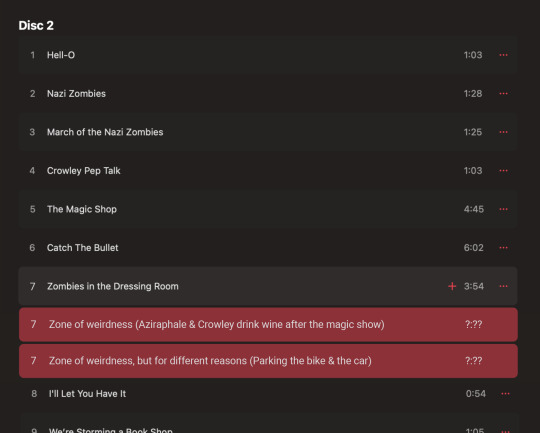
After checking each track with the show and listening side by side (for reasons that will become clear in another post) I can definitively say that there is something *very weird* going on at the end of episode 4.
First is track 7, Zombie dressing room, which seems to actually reach over two distinct scenes of the photo evidence in the dressing room and then Shax in hell even though it only has one title.


But *between* these two scenes we get an eerily silent wine date with Aziraphale & Crowley.
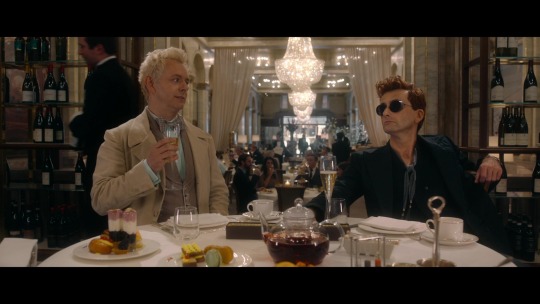
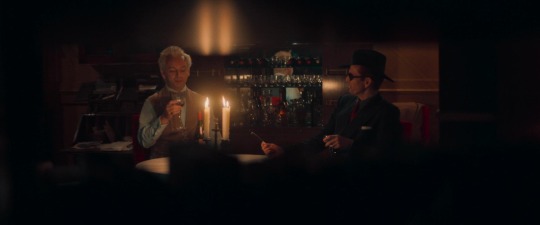
There’s really no music or even sound here besides the dialogue and room tone (until after the cheers), and it seems like a very intentionally silent version of a ritz date from season 1.
My best guess is that we are supposed to divide that track into two tracks of 7, before and after the date to get a second track 7. Or maybe the silent one is missing music?
The third track number 7 is the weirdest one. It’s this scene here, when Nina parks her bike, and Aziraphale parks the car at the end of S2E4.

If you take a close listen to the music, it’s a jaunty little piece, with an oom-pah base in 3 ⁄ 4 time. The thing is, this music does not exist in any Good Omens album. Please feel free to correct me, but I’ve tried to find any part of any song that this could even be a reprise of, and I Shazammed it to be sure it wasn’t anything else. This song does not exist anywhere except in this scene. (It quickly morphs into a reprise of the original theme once Nina leaves Aziraphale).
It’s an invisible song.
So we have 3 tracks at the end of S2E4: a long one, a silent one and an invisible one. Only one of which is numbered 7, but that all fit into that place in the track listing.
Which, when we add the two extras to the original total of fifty-nine we get... sixty-one! Hey wait a minute.
How are we going to get to 62?
3) The real missing track.
So the real reason we had to go back to the S1 album was because it contains the missing track that God is talking about. Let’s compare the last tracks on each album.


I’ve highlighted the mismatch between the in-show music and the album in S2, which means I had to add A Nightingale Sang in Berkeley Square back into the S2 album because guess what, it’s not in the S2 album. Even though it plays in the show.
You want to know how not in the album it is? Amazon had to track it in the show as a season 1 song. They had to give Tori Amos credit for her song on Good Omens in the X-ray bonus features because that’s how not in the album this song is.
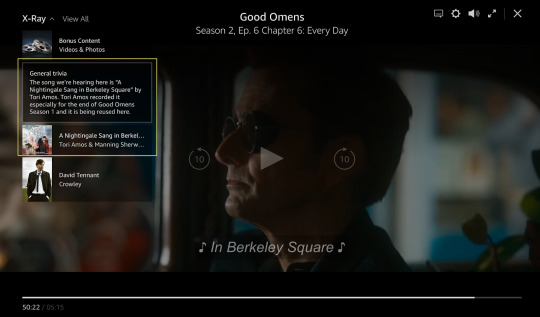
So my fellow beings, if the song is the Clue, then It’s what God Wants.
And if God wants a happily ever after with Aziraphale and Crowley on their own side, then by Job, I think Neil is going to give it to her.
-----------
And there's more where that came from! Part 2 coming shortly.
#good omens meta#art director talks good omens#go season 2#good omens 2#go2#good omens prime#good omens season two#go meta#good omens season 2#go3#good omens 2 meta#crowley x aziraphale#aziraphale#anthony j crowley#good omens spoilers
562 notes
·
View notes
Text
Welcome back to Alex's unhinged meta corner - although today it is less unhinged and more of a watertight analysis.
What I am about to present you is something most people have probably already noticed, but it has been three months and I still lose my mind while going through the final fifteen frame by frame (which is a normal thing normal people like us do, right? right).
You literally cannot convince me my following meta is wrong, and the only person whose criticism I will accept on this post is Michael Sheen and Michael Sheen ONLY. If you're not Michael Sheen (hi Michael Sheen who probably has a secret tumblr account) then your guess is as good as mine, though again, I think mine is solid.
So.
We all love and hate Aziraphale's "I forgive you", but what I find even more painful is the fact that before that he almost said "I love you". Then he stops himself and changes it, and the amount of micro-expressions on his face as he makes that decision is my current cause of death.
Here's the clip as evidence #1, and while it can definitely support itself, let's dive into the pain a little more, shall we?
One important thing I noticed is that Aziraphale doesn't look at Crowley while he stutters his way through his initial reaction. He blinks up at him for a few frames before averting his eyes again and only holds eye contact after the almost-confession (from here on referred to as IL-).
This is Aziraphale holding eye contact with Crowley (left) vs. him looking away (right):
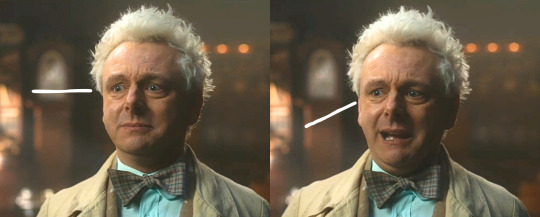
The frame on the left is from the I forgive you (IFY) part of the scene, the other one from right before IL-. If we go through the above clip little by little we will find that he avoids Crowley's face the entire time and his gaze slips further and further down, which I interpret as him overthinking/trying to come up with something to respond to this entire situation.
He is overwhelmed and surprised, caught between his two main desires: Crowley and being a Good Angel.
Combing through the frames, we can actually nail down exactly when Aziraphale first makes eye contact before the IL- and when he stops. Keep the above comparison in mind! The angle is slightly different because his chin is lower and he straightens up throughout the scene.
So! This is where he starts looking at Crowley:
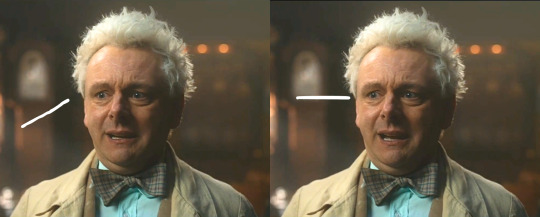
And this is where he stops:
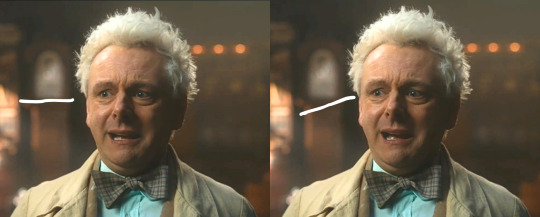
Hard to see? Let's zoom in on his eyes (numbers are the file names):


Now, you might ask me "Alex, this is all fine, although a bit insane, but why is any of this important?"
Because, fellow tumblr user and good omens enthusiast, I think that looking at Crowley is what changes his mind about what to say.
He doesn't look at him -> about to confess his feelings.
He looks at him -> says the absolutely worst possible thing.
Partly to hurt him because they're both lashing out at each other during this argument, but he looks at Crowley, looks at the person that just kissed him, that told him they could have been an us, that wants him and has always wanted him, screw everyone else.
He looks at Crowley and he wants to say l love you but then what? Once he says those words, he can't leave. He just can't.
We have to remember that they have existed within a complicated dance, a game that they have been playing for centuries without ever telling each other what that game actually is, what the rules are - because they couldn't. It was based entirely on trust and knowing the other person well enough to play it safe.
Crowley just flipped the playing board. Nothing is the way it should be, he is refusing to do their dance, refusing to play. He is looking at him and daring him to stop trying to put the pieces back on the board. The only thing neither of them has done yet is actually say I love you out loud.
Saying those words would mean stepping away from the playing board and acknowledging the room they have been playing in. It would mean saying fuck you to heaven, yes, but it would also force Aziraphale to finally define himself outside of the role he has been playing for both Crowley and heaven, and he isn't ready for that yet.
Additionally, there is the fear and/or knowledge (depending on what else the Metatron might have said or done that we did not see) that heaven will retaliate against him and Crowley if he disobeys them now, and he does not want to risk that either.
All that is what, in my opinion, happens in his head when he averts his eyes and interrupts himself. I do kinda what to make a whole different post about his facial expressions leading up to the IFY, so I will end this one with one more bit of pain.
Ready?
Firstly, the face he makes when he makes his decision.
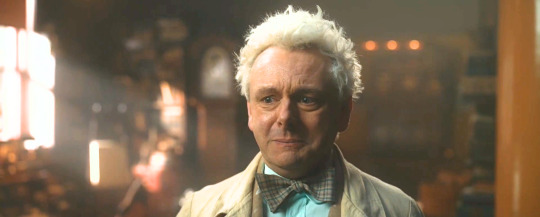
Look at the tight line of his lips, the pain etched into his face, the pure pain in his eyes.
This is the face of someone who knows exactly how badly he is going to hurt Crowley and himself. This is an apology, an I'm sorry for what I'm about to do, this hurts me as much as it hurts you. I'm sorry but I have to.

And then he winces afterwards. I don't know about you, but this is exactly the kind of face I make when I'm emotionally torturing myself with my own thoughts. For the final blow, please look at the picture very, very closely, especially the last frame, because Aziraphale isn't just sorry and he isn't just in pain.
Aziraphale is scared because he knows* that he might lose Crowley over this. He knows that saying I forgive you is (almost) unforgivable. He KNOWS.
He does it anyway because he will lose Crowley either way but he'd rather have him alive and hating him than dead.
With that I am concluding today's unhinged meta corner, thank you for your attention and you're welcome for the pain.
Also: If you want to call me a 'tin hatter' or insane or otherwise make fun of me - this is very much a girl, what were YOU doing at the devil's sacrament moment because you read my meta post all the way to the end. <3
-
*authors note: what Aziraphale thinks he knows and what is actually real is not the same thing but that's a different post
#alex talks good omens#good omens#good omens meta#ineffable husbands#crowley#aziraphale#good omens season 2#go2#aziracrow#crowley x aziraphale#ineffable divorce#the final fifteen#good omens kiss#good omens 2 meta#no nightingales
447 notes
·
View notes
Text
Ineffable Bureaucracy and Ineffable Husbands
So, especially in the early days after the release of S2, I saw and heard a lot of people comparing these two as if they were the same. There were fan comics and fanart and fanfiction that included dialogue that was something along the lines of "why are they so healthy after only a few years and we aren't?" or "why do THEY get a happy ending and we don't?" And I mean, I haven't seen any of that in a while so maybe people have come to this conclusion on their own, but just in case, I wanted to point out
That they are fundamentally different. They are not the same.
And the reason why comes down to this conversation from 2x3:

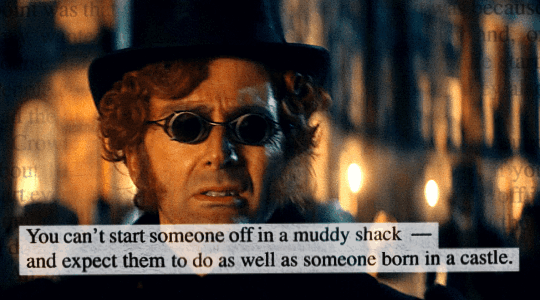
So, hold this conversation in your brain while we go through this.
First of all, we have our Ineffable Bureaucracy, Gabriel and Beelzebub.
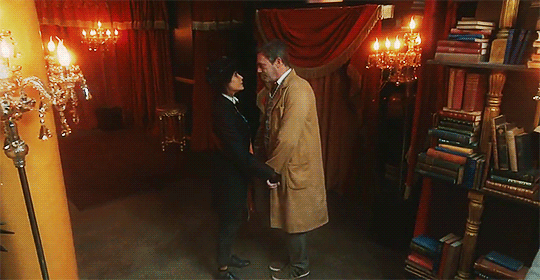
So these are the ones who, figuratively speaking, were born in a castle.
Gabriel was the Supreme Archangel for however many millenia, and Beelzebub was the Grand Duke of Hell for the same, roughly speaking. They are equals in positions of power.
So, when they fall in love, you have two supernatural authorities who have lived their existences believing that they can reasonably expect to have and keep whatever they want. After all, that's exactly what their lives have been (with the one exception being Beelzebub's Fall) - they want something, they get it, they keep it, and no one tells them no.
The biggest risk is to Gabriel. If Heaven were to find out, he would Fall. I can imagine Beelzebub being a bit concerned, but "Oh no," Gabriel probably figured "I Fall to Hell, and straight into your arms!" And I could see Beelzebub with a little smirk saying "I'd look after you, babe," in response.
The only time Gabriel actually worries is when he finds out that there's another punishment that he didn't realize was a possibility.
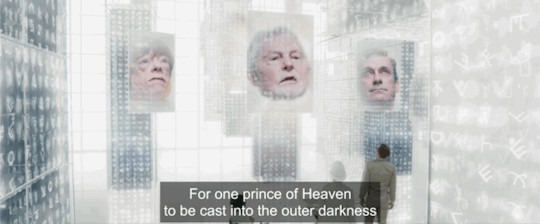
Falling to Hell is one thing, but having his memories erased is an actual threat, and possibly the first time he's ever been told no. This is when we see him panic, and leave Heaven in a mess, storing his memories away to keep them safe from the Metatron. We find out later that he was on his way to Hell anyway and just forgot halfway there and got lost.
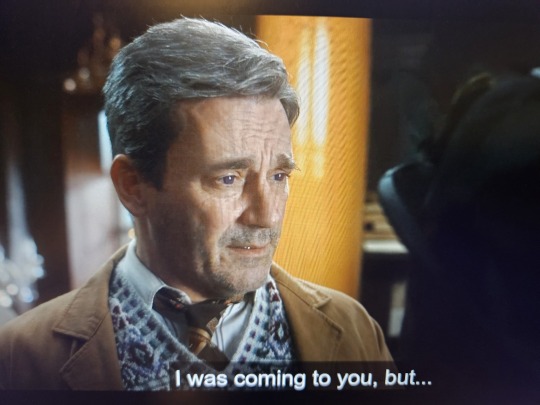
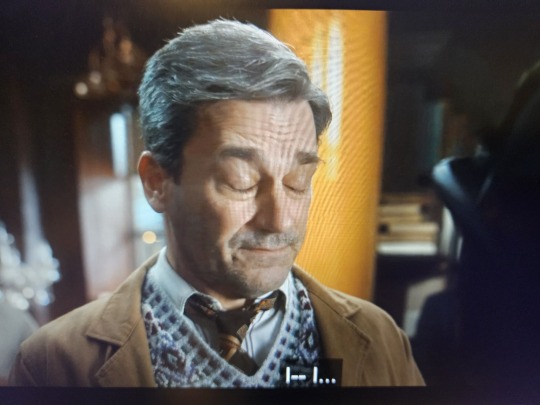
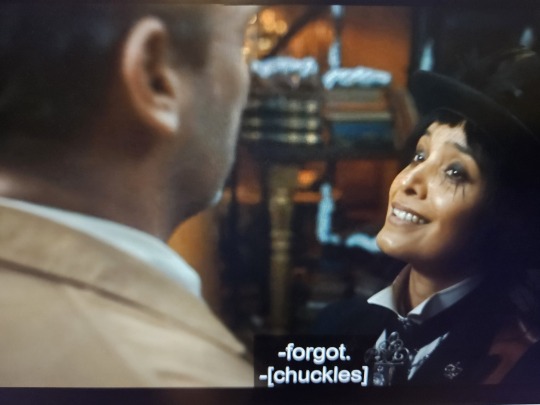
And so, we have two beings who were always told they were Good Enough, who approached each other knowing they were able to have whatever they wanted, and were therefore able to communicate and fall in love in a healthy way. They didn't need to tip toe or hide, because they had no reason to believe anyone would ever tell them no until someone did. Their risk, because of their positions of authority, wasn't nearly as great as Aziraphale and Crowley's risk.
So now we come to our Precious Ineffable Husbands
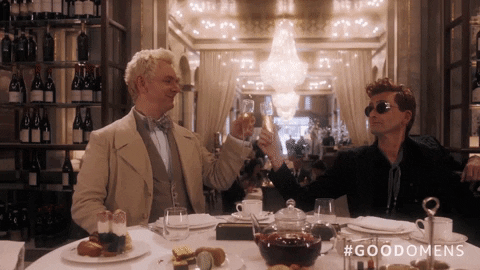
Crowley and Aziraphale start off in much lower positions on the Celestial Food Chain. We know that they have to be very careful about their relationship to avoid the repercussions. They can't mention The Arrangement out loud, they can't put their feelings for each other into words. It has been made clear to them that they are always being watched, and anything they have can be taken away from them on a whim.
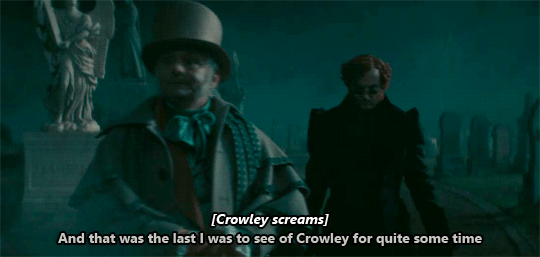
So how can they communicate safely when they've spent millenia living on eggshells and tightropes? Of course they won't, and of course it's going to be much harder for them to believe they can once they finally are safe. I definitely believe that they will get there (for my own wellbeing I have to believe that their love is stronger than anything), but they will need to fight tooth and nail in a way that Gabriel and Beelzebub didn't. All because they aren't figures of authority.
It might honestly be another good argument for Crowley taking the Grand Duke of Hell job (even though I reeeeaaaally don't want him to). It would put them in the same position as Gabriel and Beelzebub, and might give them the footing to actually escape the system (even though I think it's more likely that they're going to dismantle and/or repair the system in s3, but that's my own opinion).
These two pairs aren't mirrors of each other. Rather, they illustrate the problems with inequity that Crowley was pointing out in Edinburgh. And if S2 showed us that, I'm hoping S3 will show us possible solutions for it.
#good omens#crowley#aziraphale#ineffable husbands#aziracrow#good omens 2#good omens fandom#aziraphale x crowley#aziracrow lasts forever#gabriel#archangel gabriel#beelzebub#ineffable bureaucracy#good omens meta#good omens 2 meta#good omens analysis#ineffable fandom#this show is my roman empire#good omens thoughts
390 notes
·
View notes
Text
Posting this reply separately as it’s own thing too:
I don’t think we talk enough about the emotional impact of how bored these Angels and Demons must be.
These were beings (and frankly I don’t actually think Angels and Demons are different creatures except maybe on a surface level) created to help assist God in the planning and/or making and/or building of things like nebulas, of planets, of animals and concepts, and ideas and here they are spending day after day….processing humans souls….planning for the end of the times, keeping records….maybe stopping down every once and a while to tempt a priest or do a miracle….Jesus Christ.
Of course they’re snippy and mean! Of course they’re so focused on this Great War, that’s all they have to do! No wonder Crowley and Aziraphale seem so much more adjusted, they have actual hobbies! The space around them moves and changes, they aren’t stuck in basically boxes!
Of course Gabriel and Beelzebub were extremely and thoroughly changed from being able to listen to a song, meet with each other and discuss things, try out a pub…..they’ve probably haven’t gotten something so real, or new, or stimulating, in forever.
#good omens meta#good omens 2#good omens 2 meta#good omens 2 spoilers#ineffable bureaucracy#good omens
256 notes
·
View notes
Text
GO season 2 MASSIVE CONSPIRACY thread (spoilers)
Only click read more if you have seen the whole show or don't mind spoilers, okay kids?
Ok so I dunno who's noticed this but the metatron is shady AF when he shows up in episode six. Why is he buying coffee? And why does he push it so hard on the angel when he gets to the shop? I literally thought for a minute it was poisoned and Aziraphale was going to die, which of course is NOT WHAT HAPPENS, but did anyone else notice that there's a very quiet but noticeable miracle sound when he hands the cup to Aziraphale and makes him drink it?
The Metatron. Did something. To the Angel.
Something to make him malleable. Biddable. Willing to give up everything he loves. I'm convinced of it.
I mean, religious trauma yes. Of course Aziraphale would be insanely tempted by the sudden approval from the Metatron and, by inference, God herself when he's asked to take over. It is definitely possible that he would be torn but willing to give up what he wants for the chacne to do good and make things right.
But the fact that the Metatron asks him if he wants to bring anything along from the shop and he looks around like he has never even cared about any of it and says no, there's nothing here he needs?
NO FREAKING WAY.
He'd go, maybe, but he'd take Oscar Wilde and one of the old bibles, and in my brain he'd secretly take one of his many hidden momentos of Crowley. A feather maybe. A note.
And I don't think he'd have been so completely oblivious in the way he told it to Crowley.
Thoughts?
#good omens#good omens 2#good omens season 2#good omens 2 meta#ineffable husbands#aziraphale x crowley#freaking metatron#talk to me#lets chat
269 notes
·
View notes
Text
Hidden text?
I’ve been going insane over this for months... I don't think I've ever seen any meta posts talking about this, but if there are, feel free to link them!
So. If you look carefully at the end credits, there seems to be some sort of hidden text there in the grain filter. I'll add a couple of screenshots though tumblr will absolutely butcher the quality, so I encourage you to check the credits if you have access to them. Here's the original and one with added brightness:
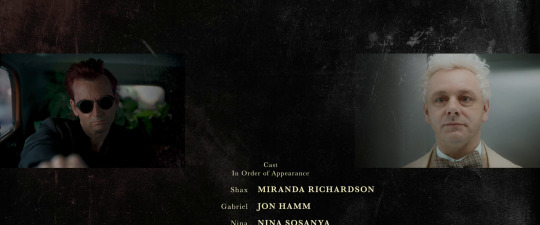


See what I'm talking about?
More under the cut
I know this is most likely nothing. That grainy filter has a lot of little details that appear to be letters or even doodles, and our brains love to find patterns. However, this text-looking line does seem a bit weird. I don't know... something about its placement there in the middle. There’s also something that looks like an “x” right below it. As the credits roll, the entire filter moves upwards. This is how it looks near the end:

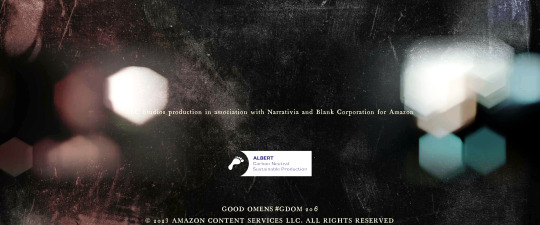

I have spent a LOT of time trying to decipher what it says but it’s too pixelated. I tried rotating the image and even mirroring it. English is not my first language, so there’s also that.


Again, this is most likely nothing lol. But I just wanted to know what you folks think!
#good omens#good omens meta#good omens 2#good omens 2 meta#good omens s2#gos2#the final fifteen#crowley#aziraphale
70 notes
·
View notes
Text
Defining Ineffable Love (or, Aziracrow Learn the Rules of Romance)
(In response to this ask about ineffables and asexuality)
One of the major threads this season was Aziraphale and Crowley asking themselves what exactly is their relationship. Not what it is in terms of how much they love each other. (That's a given.) But what it is in terms of the human implications of their love.
Crowley and Aziraphale definitely come at the relationship with different perspectives, in terms of what they’re willing to admit to the relationship being. I don’t think we can entirely interpret it in human terms.
–David Tennant (source)
For 6000 years, they’ve never put a name on their relationship. They didn’t, because they’re inhuman, genderless, sexless beings and they didn’t grow up (as it were) with labels. And even when they did learn them, they couldn’t say it was love, because admitting that was a death sentence.
All of Aziraphale’s heart eyes and pining could live comfortably in his mind if he never admitted what that said about him as an angel (trauma compartmentalization). Crowley tries desperately to be cruel and nasty to add white noise around the blatant reality of his constant loyalty to Aziraphale. If you don’t put a word to it, it’s not real and they can’t punish you.
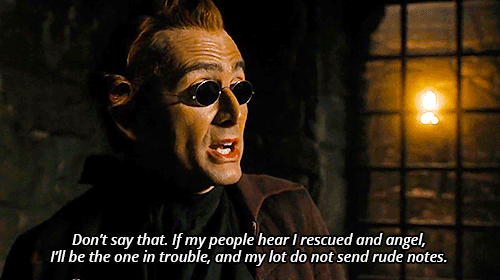
After the Not-pocalypse, for all rights and purposes, Aziraphale and Crowley chose humanity as their identity. We see Aziraphale “playing house” in various human roles (as a landlord, a private eye, a magician).
We even see Crowley intentionally taking on human behavior to handle emotional issues: “Just breathe, that’s what humans do.” They’re slowly and intentionally enculturating themselves into the world they want to belong––earth.
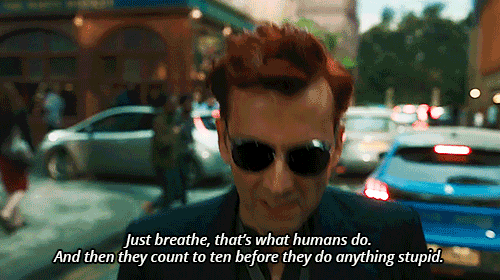
Yet it’s setting up Maggie and Nina that makes Aziraphale and Crowley start thinking about their relationship as a human construct.
Because fundamentally, Aziraphale and Crowley are not human. Like Neil Gaiman tells us constantly, they can’t be defined in human terms when it comes to gender and sexuality. They can shift and move through each and any of those markers at will, purely for the pleasure of the thing: “angels are sexless unless they really want to make an effort.”
IMO that makes them originally asexual, in the sense they were created without the need for sex. And it makes them fundamentally transgender and genderfluid, because while on earth, their sexless, eldritch spiritual bodies take on human, gendered forms and clothing. What gender (and sexuality) they identify with while on earth varies through the eras. Crowley definitely has a fluid gender identity, while Aziraphale appears to have settled on gay man (aka THE southern pansy) for his internal typology (although all of these identities are subject to change).
In the midst of all this fluidity, it’s no wonder Aziraphale and Crowley haven’t thought of their relationship in human terms before. There’s just so much different in them and their bodies than what they see in humanity. And there are no books and songs that show the kind of love they have, in the malleable, sexless bodies they have, with the background they have; it’s all ineffable.
Aziraphale and Crowley didn’t start out thinking they were in a romantic relationship. Whatever feelings they had were long repressed, redefined, and shuttled away. But they did love each other, without question. And it was that love which scared them, because it was bigger than anything they saw among humans, a love that was beautiful and blasphemous and unfathomable.
Kinda like what David Duchovny said about Mulder and Scully in The X-Files, “I don’t know if they’re in love. In a way, their relationship is deeper than that, because they cannot live without each other.”
Now take this profound, ineffable love and drop it into the little boxes and labels human culture has created for itself.
Full disclosure: I’m an asexual demiromantic person in a queerplatonic relationship, so I’ve done a fair bit of research on what romance is and how the rituals of romance are, in many ways, social inventions that vary from culture to culture. There’s love and then there’s romance, and they don’t always overlap. So my interpretation of Aziraphale and Crowley comes through this lens and the fact that Neil Gaiman has affirmed the validity of an ace-spec reading on our ineffables.
Which brings me back to my thesis: That only now are Aziraphale and Crowley thinking of themselves as a romantic couple, precisely because they are interfacing with humans and taking on their social rules.
I like this one asexual person’s description of their experience, which feels very much like our ineffables (from a very good article, I def recommend):
If there is a border between friendship and romance, then in my internal landscape, it goes right through a misty forest where no one has ever bothered to place signs....
Neither of us had intended to start anything even vaguely romantic, but the activities we did and the intense kind of immediate connection we had was coded as romantic in our culture.
That’s what Crowley realizes when Nina confronts him about his relationship to Aziraphale.
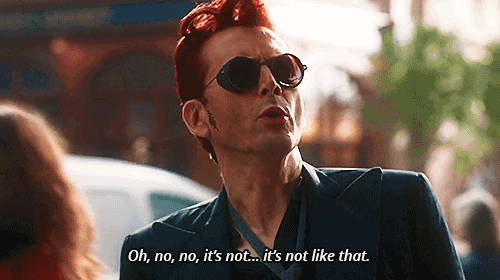
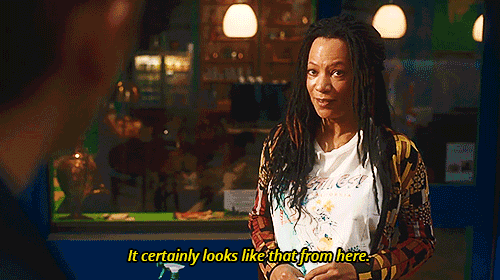
“It looks like that from here.” What Crowley and Aziraphale share is beyond definition, but Nina cannot imagine the anything beyond the human labels she was taught. The tragedy of an everlasting love is that it can only be conveyed properly to other humans if it is cast in such small human words––partner, boyfriend, husband.
Because when Crowley denied those human roles for Aziraphale, Nina slid down the path of thinking Aziraphale was just his “bit on the side,” because there were no labels left she could imagine for them. If you don’t put a word to it, it’s not real.
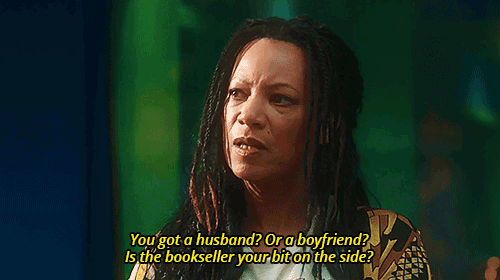
That’s the purpose of labels, to culturally validate a person's identity. Labels, of course, DO NOT create reality; people's experiences are always real, in all their varied ineffability. But labels allow a space for culture (ie other humans and political and legal society) to recognize formally your lived reality.
So Crowley started really thinking about him and Aziraphale, about the ineffable love between them and realized that in human terms, those would be the things he’d call Aziraphale, because those were the words that gave Aziraphale that place of importance in his life.
But with that realization comes all the human trappings and behavioral patterns around those words (the candlelit dinners, dramatic rescues, drinks at the Ritz, etc.) which Crowley had never thought of before, and yet… maybe romance is what he and Aziraphale have been doing all along.
That’s why this season centered so much around Aziraphale and Crowley using cultural artifacts (film and literature) to understand romance, because romance is so deeply socially-defined.
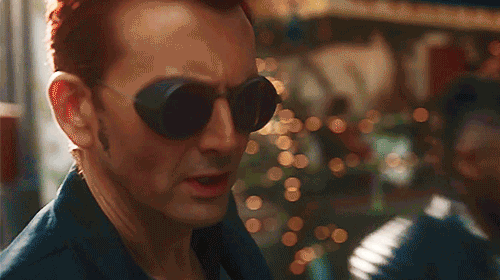
Aziraphale himself has been leaning hard into the romantic social cues (he’s more well-read in the cultural trappings of romance than Crowley is), especially post-Blitz. But when he watches Maggie and Nina dancing, he works up the courage to do something with Crowley that’s even more explicitly loaded as “traditionally romantic” than anything he’s done up to that point.
Because while risking their lives for each other and defying everything for each other is love in its purest form, dancing (specifically in Jane Austen’s world) is a public performance coded for potential marriage partners. It's an intimate ritual of the entire body. (And in British slang, dancing has been used as a euphemism for sex.)
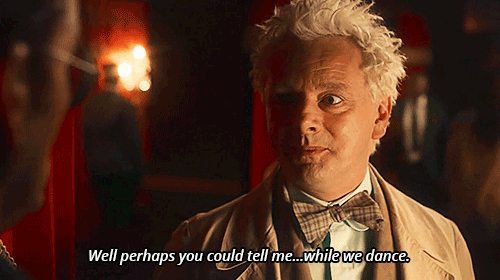
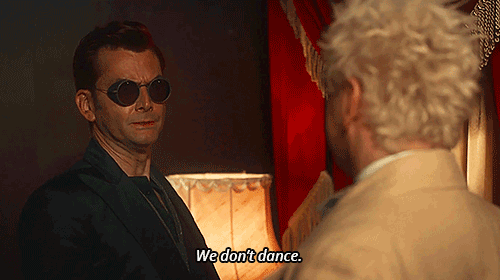
Crowley's "We don't dance" is really telling, because it shows Crowley’s awareness of the unknowable devotion between them vs the human roles Aziraphale is asking him to fill, specifically its physical aspects. Aziraphale is asking to make their relationship more public, more physically explicit, more coded as romantic in a setting specifically intended to couple individuals.
While Maggie and Nina inspired Aziraphale to progress their relationship into a publicly physical direction, Maggie and Nina inspired Crowley to think of the emotional implications of their human roles: the commitment, security, and monogamy of a husband, a partner, an us.
That’s what he decides after Maggie and Nina confront him in the end. “You never say what you’re really thinking.” He wants to codify his relationship so they each become responsible to one another. Aziraphale has always been his soulmate, the one he could always rely on. But he wants to place a word and a role to their love that will bring with it Aziraphale’s commitment and dedication to him.
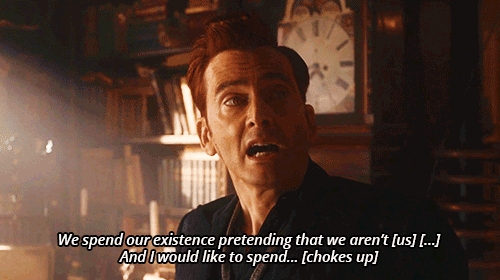
And that's another reason why Crowley kisses Aziraphale, because he knows Aziraphale was willing to make their relationship physical, and he wants that, too. To consummate this bond in the way humans do.
But Crowley doesn’t really know how to kiss; he’s not as worldly as he makes out to be. (It’s Aziraphale who owns the gun, and Crowley who’s never fired one.) He uses the kiss as a tool to get across to Aziraphale what he wants for them, in the physical language Aziraphale has been using, because "one fabulous kiss and we're good," right?
But it doesn’t work, because real life and real emotions don’t work like that; life and love don’t follow a script, despite the novels and plays and songs.
Aziraphale and Crowley spent this entire season trying to figure out what their relationship is and what they wanted out of it, trying to make sense of the unfathomable thing they share and the human implications of it, and not quite landing on the same page.
Part 2 of this Analysis, covering a correction in Crowley’s statement (“You don’t dance”) and the further implications of dancing/sex.
#please see the part 2 listed at the end for an analysis Crowley’s “you don’t dance#good omens#good omens 2#ineffable husbands#go s2 meta#go meta#good omens meta#queer#asexuality#asexual#aromantic#genderfluid#gos2spoilers#go s2#good omens 2 meta#ineffable romance#*mine#*mymeta
2K notes
·
View notes
Text
Aziraphale’s reaction to the kiss: A Breakdown (that’s it that’s the reaction.)
A lot of people say that this anguish Aziraphale feels after the kiss is due to this feeling of “Why now? Why didn’t you do this before, when I wanted you to?” And I think that can be part of it, for sure. But man, that’s just one part of this gigantic, writhing ball of emotions in Aziraphale in that moment, all of them fighting each other, all of them painful. I’m going to breakdown the breakdown, because writing essays analyzing the minds of fictional characters is apparently all I want to do these days. Also, judging by this absolute nutball of a season that confirmed literally multiple “bit of a stretch” deep dives, I feel I can ignore that little voice whispering “this is silly” into my ear. I can dive as deep as I want, because there goes Neil Gaiman with an aqualung, swimming deeper.
So. The kiss, and why Aziraphale looks so gosh darned sad about it.
First of all, there’s shock. Major shock. Because despite everything, he still likely never thought this would ever actually happen. (Him and me both.) Or maybe – a small maybe, but a maybe that I might put a dollar on, if the odds were good – the idea of kissing Crowley never occurred to his conscious brain before at all. He’s so good at compartmentalizing and denying that it’s very possible he’s managed to nip every intrusive thought before it went far enough to be fully conscious.
Then, there’s fear of being seen. (“Who is watching? Will the Metatron see? He only allowed me to work with Crowley after he regained angelic status – if he sees me and Crowley now –”) Then, a layer deeper, there’s his ever-present fear response to things going too fast, because despite how we all know he feels, he’s still not sure he’s ready for any kind of partnership, let alone one this intimate and close. Because even for humans, this is a really, really big jump – we typically don’t kiss when we haven’t even been on a date (officially) yet, and usually not before both parties admit to their feelings.
Then, even deeper, is that anguished, heartbroken “Why now? My God, why now?” response, because his subconscious has always wanted this, but also knows that this is the worst possible time for it to happen, and now he’s lost that first kiss with Crowley—the one he wanted, anyway. The one that was supposed to be filled with joy, and is instead marked with the worst pain he’s ever felt.
Then there’s the second “Why now” response, and this is where I might be dipping a toe into the Hot Take puddle. Because I think there’s that knee-jerk fear response he’s yet to shake, and which overtakes his rational thinking whenever he’s terrified of Heaven or unsure of himself. It’s the suspicion he’s always held of Crowley. He’s thinking “Why now?” as in, “Is this the temptation that God and Heaven warned me about? Is this Crowley the Serpent, fulfilling his duty? Is this the true proffered apple, a kiss that’s meant to keep me from serving Heaven? Is he tempting me, knowing how I feel, knowing I’m weak?”
That’s the true anguish of this scene, I think. He’s fighting all these feelings, but on top is this old fear, this old anger and suspicion of Crowley, assuming he’s lying. Demons lie, Crowley admitted it himself. Crowley is the original Serpent of Eden, designed to tempt people away from God. And this feeling is what’s on top, because the alternative is…what? That Crowley actually feels this way? That Crowley, a demon, loves him, Aziraphale, enough to be this vulnerable, with no wicked ulterior motive? Aziraphale is a lot of things, but he’s certainly not a being who thinks he’s desirable. He sees himself as opposite to Crowley, and if Crowley is temptation personified, Aziraphale is then the personification of undesirableness. Deep down, this idea of the Serpent of Eden being tempted by him, Aziraphale, is simply ludicrous.
And then there’s self-hatred that he even thinks this thought of his friend, then suspicion, then fear again, then confusion, then anguish, then fear, then pain, and so on. All of this happens in a few seconds, and all of it coalesces into a singular takeaway: “This is the worst.” And because the one who technically caused it is Crowley, Aziraphale does what he does very well: he forgives Crowley, because he’s too prim and angelic to say “Goddamn you,” which is what he truly means. Goddamn you for making me feel this way. Goddamn you for making me doubt you. Goddamn you for forcing this option on me, when I can no longer take it, and when I don’t even know if it’s real. Goddamn you for putting this apple in my hands when we both know I can’t eat it. Goddamn you for reminding me that no matter what, it is not in my stars to live a happy life.
#good omens 2#good omens#good omens 2 spoilers#good omens spoilers#good omens meta#good omens 2 meta#go2#go2 spoilers#gos2#gos2 spoilers#good omens s2 spoilers
1K notes
·
View notes
Text
Guys. Let's talk about the Eccles cakes. Shall we?

When Crowley orders six shots of espresso, Aziraphale considerately asks for something that "calms people down". Nina then suggests him to get Eccles cakes.
Now the word, "Eccles" originally means "The church". It foreshadowed the season finale where Aziraphale asks Crowley to join heaven. It is a callback to Crowley being the (sauntered-vaguely-downwards) fallen angel. Crowley was given a choice to join heaven again. To eat the Eccles cake. But he doesn't. He doesn't want to be calmed down and hushed. He has found his voice, his own side. He knows the truth about Heaven and Hell and God.
The Eccles cake is also called the "squashed fly cake' because the inside is filled with black currants. This could be a metaphor for hell. How Crowley was also asked back to hell and he said no.
Aziraphale ordering Eccles cakes shows the inner struggle that he is facing. He cares for Crowley. He wants to be there for him. But at the same time, he believes whole heartedly in heaven. He still thinks of God's plan as ineffable. As indubitable. He believes that Crowley and he will be happier in Heaven. He fails to see that even if heaven seems to be the side of "truth and light", on the inside it's all squashed flies. It's just as bad as hell. That when heaven ends life on earth it will be just as dead as hell ended it.
#good omen season 2#neil gaiman#good omens#david tennant#michael sheen#eccles cakes#go2 spoilers#go2#goodomens spoilers#good omens 2#good omens 2 meta#good omens episode 6#good omens easter eggs
179 notes
·
View notes
Text
good morning folks today I am once again going feral over the final scene from A Companion To Owls and I have fucking thoughts about how Crowley has always known Heaven/Hell better than Aziraphale.
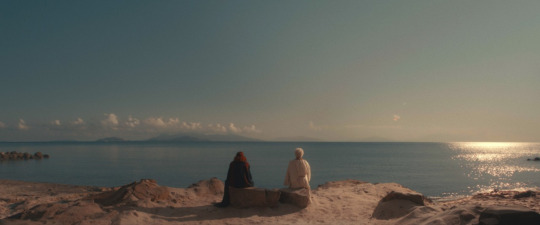
So first of all.
[“I’m not taking you to Hell, angel.”
“Why not?”
“Well, I don’t think you’d like it.”]
This is adorable and gentle of Crowley, yes. But also, this is not Crowley saying he can’t take Aziraphale to Hell, only that he isn’t. That’s an important distinction. What Crowley is saying, in the spaces between his words, is that yes, Aziraphale has lied to thwart the will of God, and that yes, Crowley himself Fell for less. But Crowley knows that things don’t work that way anymore. He knows that Heaven isn’t in the business of making people Fall, not anymore, or at the very least he’s learned over a few thousand years that what Heaven and Hell don’t know won’t kill them.
Crowley understands better than Aziraphale does.
And then also. Fucking ALSO. The final lines of that episode.
[“That sounds…”
“Lonely?”
“You said it wasn’t.”
“I’m a demon. I lied.”]
These words have been haunting me for over three weeks, since I first saw Episode Two in a cinema in Edinburgh. I said at the time that they’re the most devastating lines in the series; with Episode Six, they’ve slipped back a bit in those rankings, but they still are high.
Because, okay. Crowley lied, but not because he’s a demon. Crowley does lots of things other demons don’t do.
Crowley says “I’m a demon,” because that’s easier than saying “They don’t care, it doesn’t fucking matter, we are alone up/down here.” Because it is lonely, and when he’d said it wasn’t, he was lying to protect Aziraphale, to keep Aziraphale from knowing just how lonely he actually had been for thousands of years.
Crowley didn’t lie because he’s a demon. He lied because he loves Aziraphale, and because he was guarding his heart. And then Aziraphale went against the will of God, and suddenly, Crowley didn’t have to be so lonely anymore. They were, for maybe the first time, a group of the two of them.
Until.
[“I don’t think you understand what I’m offering you.”
“I think I understand a whole lot better than you do.”]
Crowley does. He knows that Heaven will never change, that for all Aziraphale’s best intentions, there is nothing that one single hedonistic idealist can do against more-than-millennia of bureaucracy and condescension and compliance to a plan no one understands. He knows Heaven and Hell better than Aziraphale does. He knew that keeping Gabriel would cause problems, would bring them back into the firing line, but Aziraphale was caught up in doing the right thing because some part of him still believes that Heaven does the right thing, too.
Crowley knows better. He knows Heaven has never, not once, been concerned with doing the right thing (“I have a permit”). Aziraphale goes along with Heaven as far as he can, until push comes to shove and he has to choose the right thing over the Heavenly one. Crowley’s seen it happen again and again. Aziraphale just… doesn’t see it for what it is, or maybe he doesn’t want to.
Crowley understands Heaven and Hell a fucking lot better than Aziraphale does, and at the end of the day, the fact that he’s never once communicated what he knows is the end of their ‘us.’
172 notes
·
View notes